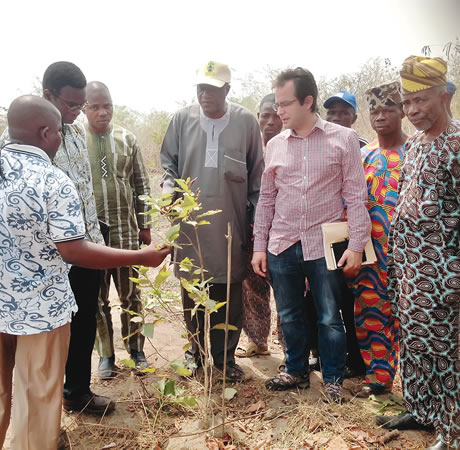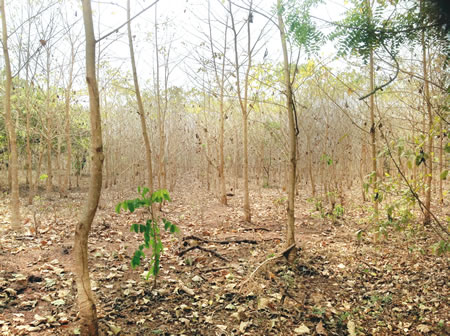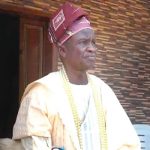THE Charcoal Development Dealers Association of Nigeria (CDDAN) recently took a step towards smooth exportation of their products by commencing the process of certification through an international organisation. TUNDE OGUNESAN reports the exercise and its implication on charcoal business in the country, especially the South-West.
WHEN the Federal Government considered banning the exportation of charcoal in Nigeria on the premise that the Charcoal Development Dealers Association of Nigeria (CDDAN) failed to adhere to its policy of cut-one-plant-two, the CDDAN felt trapped. The association expressed its reservation to government to spare them the impending hardship the decision could cost hundreds of its members.
The association, under the leadership of Alhaji Ayeriyina Ibrahim Alabi, availed the Federal Government of their plan to maintain the afforestation status and even strive to meet international standards in the course of their trade. He also added that the association had a plan of planting several hectares of trees in some states in South-West Nigeria. It further revealed its move to have a working relationship with the Forestry Research Institute of Nigeria (FRIN), towards ensuring total and international standard in the way business activities were carried out.
Speaking in relation to the standard of Nigerian Export Promotion Council’s (NEPC) vision of setting standards for individuals or association that intended to export goods from Nigeria to other parts of the world, the NEPC Executive Director/Chief Executive Officer, Mr Segun Awolowo, stated that “it is true that anybody can export goods from Nigeria to their clients outside the shores of Nigeria as long as they meet all the laid down requirements for those in the exporting business in Nigeria. It is a fact that no country would want to allow people to export goods from her shores without ensuring that the goods meet certain standards.” This, CDDAN, in the words of Alhaji Alabi, had as the priority of its association.
To fulfil the Federal Government’s policy of cut-one-plant-two policy, CDDAN, according to him “has written a letter to the Minister of Environment through the director of Forestry in a reference letter CDDA/EXT/0025 and dated June 20, 2016, detailing the activities of the association according to government directive.”
He said: “Our association had willingly embarked upon the planting in several zones of Oyo State and parts of Ogun State. In 2009, we established five hectares plantation each at Osho forestry reserve in Ijaye, Ido Local Government Area, Olaseinde in Surulere Local Government Area, Opapa forestry reserve in Saki West Local Government Area and Alawonpala village in Iseyin Local Government Area; all these 20 hectares of teak plantation in Oyo state government reserve.
“In the free areas of Oyo State, our association had planted in the three zones of Oyo State, 30 hectares in Otu, Idi-Iyin plantation at Ilero, Itesiwaju Local Government Area, which was commissioned by the former Commissioner for Agriculture in Oyo State, Bimbo Kolade, precisely on October 17, 2012. We also had another 15 hectares of trees planted at Agbakoba village in Atiba Local Government Area, while we planted another 30 hectares species of trees in Oshee village at Igangan, Ibarapa North Local Government Area to further encourage afforestation.”
Furthermore, the CDDAN president informed that they had been working in collaboration with the Forestry Research Institute of Nigeria (FRIN) to plant 30 hectares of Eucalyptus trees at Ijio in Iwajowa Local Government Area and Otu in Itesiwaju Local Government council, in Oyo State. Alhaji Ayeriyina further added that its collaboration with FRIN in 2015 earned the association 18,000 seedlings of Eucalyptus, worth over one million Naira.
In its bid to further step up its objectives in ranking among the best exporters in their business category on the world map, on Tuesday, February 22, 2016, CDDAN with two representatives of its partner agency, FRIN, welcomed a representative of one of the world’s leading firm in forest management certification, Pacific Salmon Commission (PSC), to Nigeria.
The PSC is an international decision-making organisation, composed of four commissioners (and four alternates) from the United States and Canada. This body handles ongoing administration of the Pacific Salmon Treaty through advice from four regional panels of fisheries experts.
Part of its vision is to promote responsible management of the world’s forests, that is to say, a management that is environmentally appropriate, socially beneficial and economically viable. Environmentally, appropriate forest management ensures that the harvest of timber and non-timber products maintains the forest’s biodiversity, productivity, and ecological processes.
Socially beneficial forest management helps both local people and society at large to enjoy long term benefits and also provides strong incentives to local people to sustain the forest resources and adhere to long-term management plans.
Economically viable forest management means that forest operations are structured and managed so as to be sufficiently profitable, without generating financial profit at the expense of the forest resource, the ecosystem, or affected communities. The tension between the need to generate adequate financial returns and the principles of responsible forest operations can be reduced through efforts to market the full range of forest products and services for their best value.
From its website, www.fsc.org, FSC issues three different types of certificates: forest management, chain of custody and controlled wood.
The different types of certificates relate to different stages of production and subsequent progress of forest products through the value chain. Verification against all FSC requirements ensures that materials and products with the FSC label are from responsibly managed forests.
Forest owners and managers who wish to show their logging operations are socially beneficial, carried out in a satisfactory environmental perspective and economically viable can apply for a certificate of Forest Management (FM). The FM certificate is awarded to forest managers or owners whose management practices meet the requirements of the FSC Principles and Criteria.
Chain of Custody certification ensures that all branded products through the chain are from certified forests. It verifies the rigorous monitoring of traceability of FSC certified wood, from the certified forest to the finished product. This certificate is designed for companies that manufacture, process or trade forest products (timber products or non timber forest products) and want to show their customers that they use raw materials produced in a responsible manner. This certificate enables companies to strengthen their procurement policy while satisfying demand (public or private) according to FSC criteria.
Controlled Wood is designed to allow organisations to avoid the categories of wood considered unacceptable. FSC Controlled Wood can only be mixed with FSC certified wood in labelled FSC Mix products.
With its headquarters in Bonn, Germany, and 29 branches in 29 countries in Europe, America and South America, PSC also has two regional offices in Africa – South Africa and Congo.
As at December 9, 2016, FSC has certified 194,093,509 individuals and organisations with 31,622 CoC certificates and 1,453 FM/CoC certificates. In Africa, it has certified 7,592,153 with 170 CoC certificates.
Alhaji Alabi led scores of members of the association from Oyo, Otu, Ilero, Igangan to receive the representative of FSC Congo Basin Programme Manager, Mathieu Schwartzenberg, to the tree plantations in Oyo State. The team was also joined by the duo of the assistant national secretary, representing the Forestry Association of Nigeria (FAN) and Department of Wood Products Engineering, University of Ibadan, Dr Nureni Adedapo Adewole, and Professor Abel Olajide Olorunnisola, to give CDDAN technical support towards fulfilling conditions for certification by the Forest Stewardship Council.
The FSC Congo Basin Programme Manager, Schwartzenberg informed that CDDAN contacted its office for certification around October 2016. He said their aim was to get certificate to sell their products in a more sustainable way.
He confirmed his presence to begin the process which he said would lead “the association into having access to many big charcoal customers in Europe at the end of supply chain. Now, to sell charcoal in Europe, they will need to get the certificate.”
Some of his areas of concern during the discussion with members of CDDAN were the source of the wood used in producing charcoal, the new policy on afforestation by the Federal Government, among others.
Schwartzenberg, in an interview, disclosed that FSC has its standard which cannot be lowered for any reason, but advised individuals and organisations that were ready to embark on export business to be committed to meeting the required standard. He revealed that he was happy with the determination of members of CDDAN to get certified, but warned that if findings which he would present met the required standard, the association should be ready to sustain the tempo.
His major concern was the composition of CDDAN as an association; the numbers, reasons for afforestation; specie of woods planted; year of planting; size of plantations; locations and features of the trees planted.
In an interview, Schwartzenberg, who had lived in Africa for over 15 years, reiterated the fact that that FSC was not a marketing agency but an organisation which mandates it for forest management as a matter of its first principle and criteria. He noted that this aspect required forest managers to comply with all applicable laws and regulations in the country of harvest, and with international treaties.
He said: “my mission is to explore the possibility of setting a process to start certification in Nigeria. This is the just the explanatory mission to see what is on ground to know and know what to do at a particular time. Though, I did not spend much time on the field as I am able to be on the field for one day, I discovered that there is a visibly willingness from the small holders to protect the environment by embarking on the planting of trees to cater to the affected areas. This is what I am able to do in one day. There is need for further investigation.”
This, Schwartzenberg said, is the prerequisite step to certification, noting that the next stage would be for the audit office to come and check the level compliance of operation conducted by the people involved.
“First, nobody has the right to degrade the forest and turn the forest into a non-forest which not the case here. This is just the use of highly degraded forest already. We have to sit down together with my organisation and other stakeholders on how to set the stage for responsibility of management for this particular case,” he stated.
He stated that it was not the mission of FSC to help in finding customers for the association, but hinted that if they get certified by the FSC, they could secure their businesses and help in that direction.
On certification by CDDAN, Schwartzenberg said it was too early to conclude on certification, noting that “I have just come here to see some things for myself. I have to discuss with some of my colleagues who are plantation specialists who will carry out the rest of the work before we can talk of certification. This is just explanatory work and it is too early to say something like that.”
In their assessment, Professor Olorunnisola and Dr Adewole, who are university lecturers and experts in wood utilisation, said the process was a good development but warned that due process must be followed to the latter.
The duo provided technical support for the association as well as provided necessary technical responses to Schwartzenberg during the exercise.
In all, two tree plantations; Otu and idi-Ayin, Ilero were visited. At Otu, the melina trees planted there are over a year old, while the same trees in Ilero were almost five years old.
Alahaji Ayeriyina described the development as a success story of the association buoyed by determination, in spite of various challenges to discourage them from achieving the feat.
His words: “Whatever we achieve or aim at is to the glory of God and the doggedness of my members. When we conceived the idea of planting trees, others believed it would take longer time to reap the fruit. After we achieved that, we promised ourselves that we wouldn’t rest on our oars until we got to the very peak of our business calling. We also vowed to work with any class of people that could help us in achieving that dream. Our target now is to expand the scope of our operation in conjunction with all stakeholders. This we believe we can achieve together with courage and determination.”
WATCH TOP VIDEOS FROM NIGERIAN TRIBUNE TV
- Let’s Talk About SELF-AWARENESS
- Is Your Confidence Mistaken for Pride? Let’s talk about it
- Is Etiquette About Perfection…Or Just Not Being Rude?
- Top Psychologist Reveal 3 Signs You’re Struggling With Imposter Syndrome
- Do You Pick Up Work-Related Calls at Midnight or Never? Let’s Talk About Boundaries







